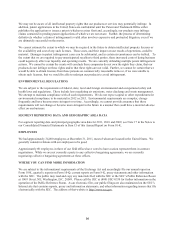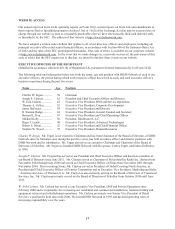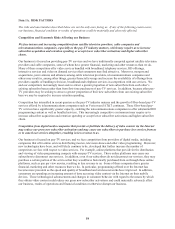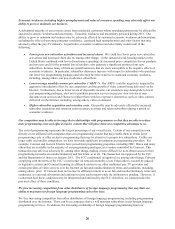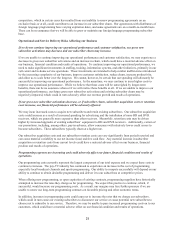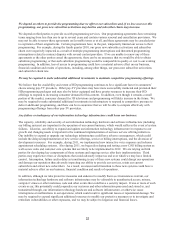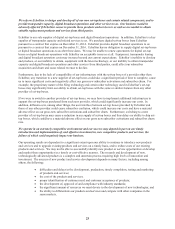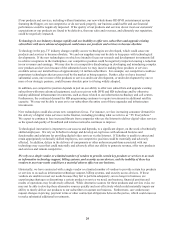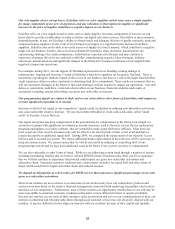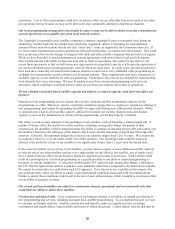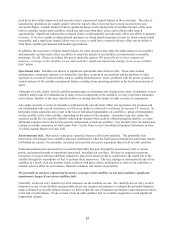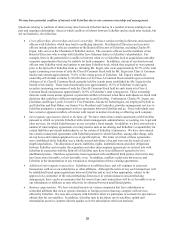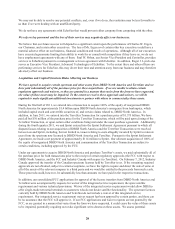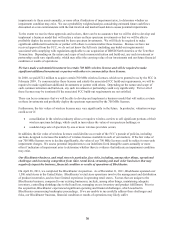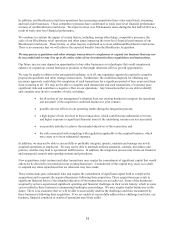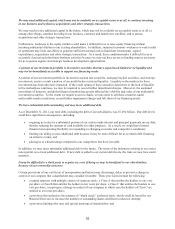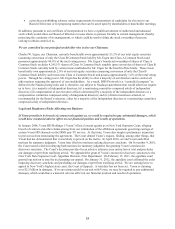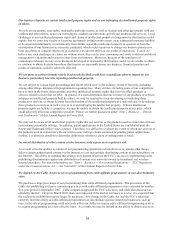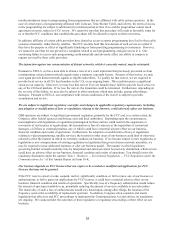Dish Network 2011 Annual Report Download - page 35
Download and view the complete annual report
Please find page 35 of the 2011 Dish Network annual report below. You can navigate through the pages in the report by either clicking on the pages listed below, or by using the keyword search tool below to find specific information within the annual report.25
25
Our sole supplier of new set-top boxes, EchoStar, relies on a few suppliers and in some cases a single supplier,
for many components of our new set-top boxes, and any reduction or interruption in supplies or significant
increase in the price of supplies could have a negative impact on our business.
EchoStar relies on a few suppliers and in some cases a single supplier, for many components of our new set-top
boxes that we provide to subscribers in order to deliver our digital television services. Our ability to meet customer
demand depends, in part, on EchoStar’s ability to obtain timely and adequate delivery of quality materials, parts and
components from suppliers. In the event of an interruption of supply or a significant price increase from these
suppliers, EchoStar may not be able to diversify sources of supply in a timely manner, which could have a negative
impact on our business. Further, due to increased demand for products, many electronic manufacturers are
experiencing shortages for certain components. EchoStar has experienced in the past and may continue to
experience shortages driven by raw material availability, manufacturing capacity, labor shortages, industry
allocations, natural disasters and significant changes in the financial or business conditions of our suppliers that
negatively impact our operations.
For example, during 2011, several regions of Thailand experienced severe flooding, causing damage to
infrastructure, housing and factories. Certain of EchoStar’s hard drive suppliers are located in Thailand. There is
uncertainty regarding the ultimate impact of this event on our business, but there is a risk in the future that EchoStar
could experience delays or other constraints in obtaining hard drive components. There can be no assurance that we
will not encounter shortages in the future or that such shortages will not negatively impact our operations. Any such
delays or constraints could have a material adverse affect on our business, financial condition and results of
operations, including, among other things, our gross new subscriber activations.
Our programming signals are subject to theft, and we are vulnerable to other forms of fraud that could require us
to make significant expenditures to remedy.
Increases in theft of our signal or our competitors’ signals could, in addition to reducing new subscriber activations,
also cause subscriber churn to increase. We use microchips embedded in credit card-sized cards, called “smart
cards” or Security Access Devices.
Our signal encryption has been compromised in the past and may be compromised in the future even though we
continue to respond with significant investment in security measures, such as Security Access Device replacement
programs and updates in security software, that are intended to make signal theft more difficult. It has been our
prior experience that security measures may only be effective for short periods of time or not at all and that we
remain susceptible to additional signal theft. During 2009, we completed the replacement of our Security Access
Devices and re-secured our system. We expect additional future replacements of these devices will be necessary to
keep our system secure. We cannot ensure that we will be successful in reducing or controlling theft of our
programming content and we may incur additional costs in the future if our system’s security is compromised.
We are also vulnerable to other forms of fraud. While we are addressing certain fraud through a number of actions,
including terminating retailers that we believe violated DISH Network’s business rules, there can be no assurance
that we will not continue to experience fraud which could impact our gross new subscriber activations and
subscriber churn. Sustained economic weakness may create greater incentive for signal theft and other forms of
fraud, which could lead to higher subscriber churn and reduced revenue.
We depend on third parties to solicit orders for DISH services that represent a significant percentage of our total
gross new subscriber activations.
Most of our retailers are not exclusive to us and some of our retailers may favor our competitors’ products and
services over ours based on the relative financial arrangements associated with marketing our products and services
and those of our competitors. Furthermore, most of these retailers are significantly smaller than we are and may be
more susceptible to sustained economic weaknesses that make it more difficult for them to operate profitably.
Because our retailers receive most of their incentive value at activation and not over an extended period of time, our
interests in obtaining and retaining subscribers through good customer service may not always be aligned with our
retailers. It may be difficult to better align our interests with our resellers’ because of their capital and liquidity



